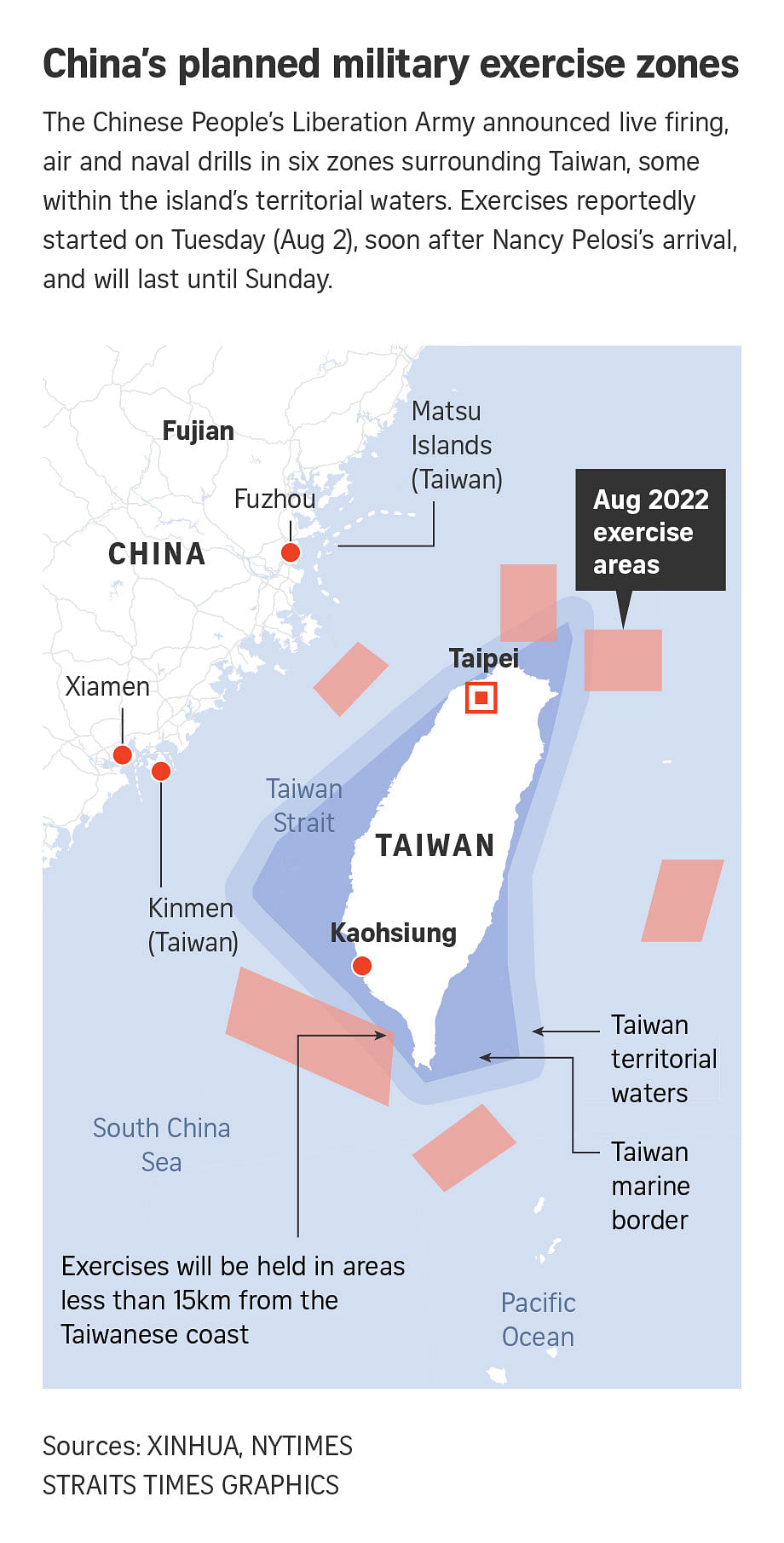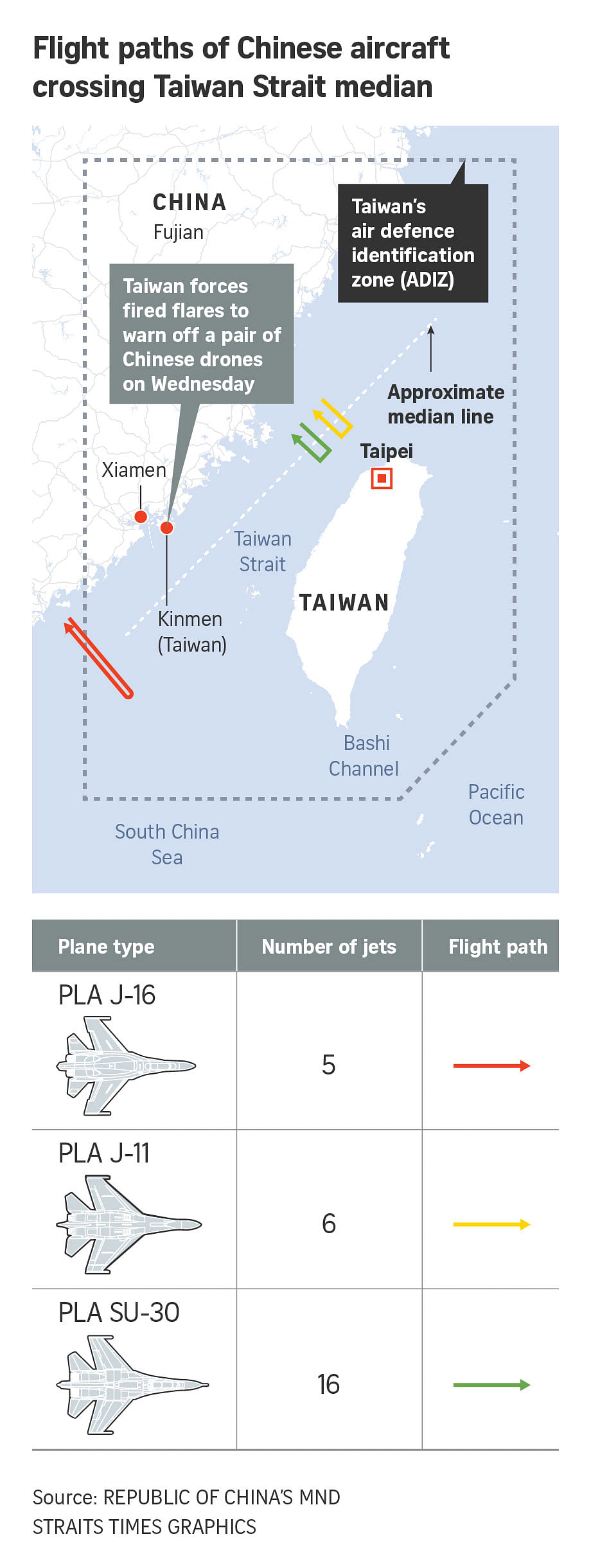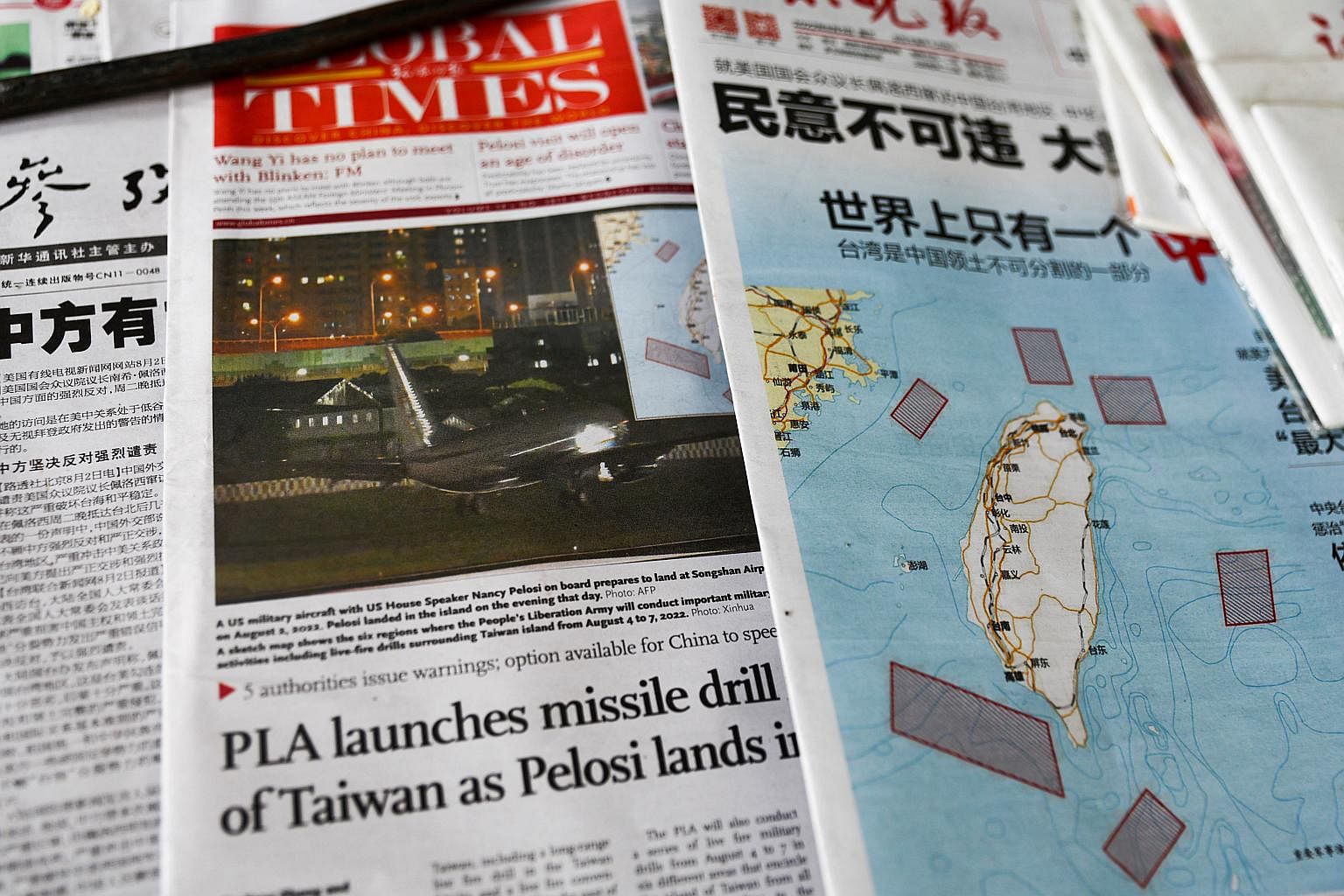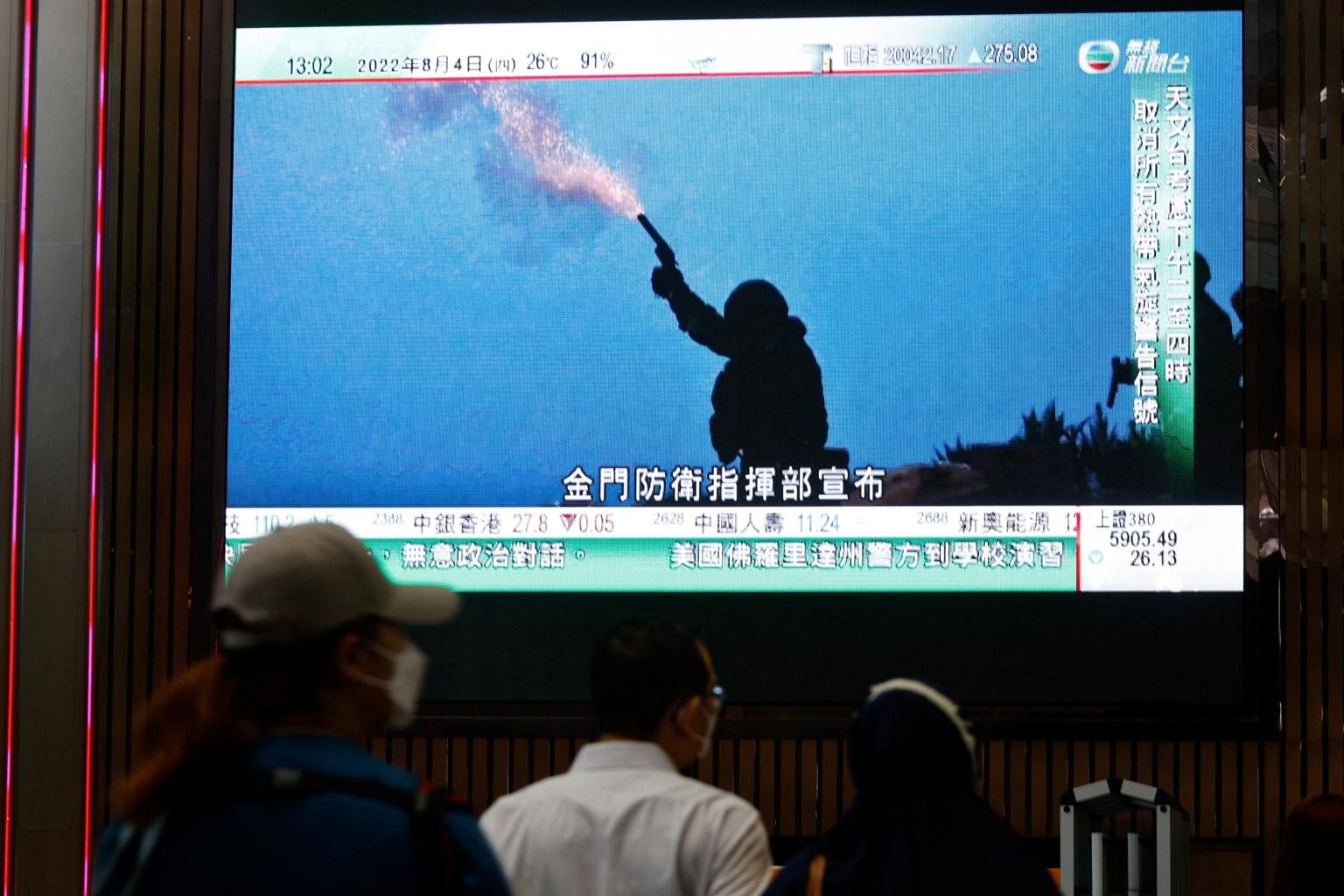China fires multiple ballistic missiles around Taiwan in largest-ever drills
Sign up now: Get insights on Asia's fast-moving developments
Follow topic:
TAIPEI (REUTERS, AFP, BLOOMBERG) - China fired multiple missiles around Taiwan on Thursday, launching unprecedented military drills a day after a visit by US House of Representatives Speaker Nancy Pelosi to the self-ruled island that Beijing regards as its breakaway province.
The exercises, China’s largest ever in the Taiwan Strait, began as scheduled at midday and included live-firing in the waters to the north, south and east of Taiwan, bringing tensions in the area to their highest in a quarter century.
China’s Eastern Theatre Command said at around 3.30pm local time (0730 GMT), it had completed multiple firings of conventional missiles in waters off the eastern coast of Taiwan as part of planned exercises in six different zones that Beijing has said will run until noon on Sunday.
Taiwan’s defence ministry said 11 Chinese Dongfeng ballistic missiles had been fired in waters around the island. The last time China fired missiles into waters around Taiwan was in 1996.
Taiwan officials condemned the drills, saying they violate United Nations rules, invade its territorial space and are a direct challenge to free air and sea navigation.
Tensions had been building ahead of Mrs Pelosi’s unannounced but closely watched visit to Taiwan, made in defiance of heated warnings from China.
Before Thursday’s drills officially began, Chinese navy ships and military aircraft briefly crossed the Taiwan Strait median line several times in the morning, a Taiwanese source briefed on the matter told Reuters.
By midday, warships from both sides remained in the area and in close proximity, and Taiwan scrambled jets and deployed missile systems to track multiple Chinese aircraft crossing the line.
“They flew in and then flew out, again and again. They continue to harass us,” the Taiwanese source said.
In Taiwan, life was largely as normal, despite worries that Beijing could take the unprecedented step of firing a missile over the main island, similar to a launch by North Korea over Japan’s northern island of Hokkaido in 2017.
Taiwan residents are long accustomed to Beijing’s threats.
“When China says it wants to annex Taiwan by force, they have actually said that for quite a while,” said Chen Ming-cheng, a 38-year-old realtor. “From my personal understanding, they are trying to deflect public anger, the anger of their own people, and turn it onto Taiwan.”
However, Taiwan said that the websites of its defence ministry, foreign ministry and the presidential office were attacked by hackers, and warned of the likelihood of stepped up “psychological warfare” in coming days.

On Wednesday night, just hours after Mrs Pelosi left for South Korea, unidentified aircraft, probably drones, flew above the area of Taiwan’s outlying Kinmen islands near the Chinese coast, Taiwan’s defence ministry said.
Major General Chang Zone-sung of the army’s Kinmen Defence Command told Reuters that the drones came in a pair and flew into the Kinmen area twice, at around 9pm and 10pm on Wednesday.
The heavily fortified Kinmen islands lie just 10km from the Chinese mainland city of Xiamen.
The first Taiwan Strait crisis broke out in 1954 when Chiang Kai-shek's Nationalists placed thousands of troops on the Taiwan-ruled Kinmen and Matsu islands.
China, then led by Communist Party leader Mao Zedong, responded with artillery bombardments of the islands.
'Reshaping strategic landscape'
The locations of China's current live-firing exercises encircle the island in an unprecedented formation, Professor Meng Xiangqing of the National Defence University told Chinese state television, describing how an actual military operation against Taiwan could play out.
“In fact, this has created very good conditions for us when, in the future, we reshape our strategic landscape conducive to our unification,” Prof Meng said.
Chinese forces in two areas off the northern coast of Taiwan could potentially seal off Keelung, a major port, while strikes could be launched from an area east of Taiwan targeting the military bases in Hualien and Taidong, he said.
The “doors” to Kaohsiung could also be closed by Chinese military off the southwestern coast, he said.

Unusually, the drills in six areas around Taiwan were announced with a locator map circulated by China’s official Xinhua news agency earlier this week – a factor that for some analysts and scholars shows the need to play to both domestic and foreign audiences.
China has repeatedly said that its differences with the self-ruled island are an internal affair.
“Our punishment of pro-Taiwan independence diehards, external forces is reasonable, lawful,” China’s Beijing-based Taiwan Affairs Office said on Thursday.

China's defence ministry on Thursday said Mrs Pelosi's visit was a severe threat to peace in the Taiwan Strait and that it had seriously damaged the trust between the militaries of both China and the US.
"China is strongly indignant and strongly opposed to this. The Chinese military means what it says," defence ministry spokesman Tan Kefei said.
"The Eastern Theatre Command of the Chinese People's Liberation Army has organized targeted drills in the sea and airspace surrounding the island of Taiwan, including joint sea assaults, land strikes, and air superiority operations as a a solemn deterrent against US-Taiwan collusion."
China’s Foreign Minister Wang Yi called Pelosi’s visit to Taiwan a “manic, irresponsible and highly irrational” act by the United States, state broadcaster CCTV reported.
Mr Wang, speaking at a meeting of South-east Asian foreign ministers in Phnom Penh, Cambodia, said China had made the utmost diplomatic effort to avert crisis, but would never allow its core interests to be hurt.
The foreign ministers in a statement had earlier called on China to resolve tension around the Taiwan Strait in a peaceful manner, and warned that volatility caused by tensions in the Taiwan Strait could lead to “miscalculation, serious confrontation, open conflicts and unpredictable consequences among major powers”.
The Chinese foreign ministry on Thursday said that a meeting between Mr Wang and his Japanese counterpart on the sidelines of Asean events in Cambodia had been cancelled.
The Chinese side was strongly displeased with the joint statement put out by the G-7 nations about Taiwan, said foreign ministry spokeswoman Hua Chunying at a regular media briefing.
Taiwan's President Tsai Ing-wen thanked the G-7 nations for supporting regional peace and stability after their statement.
She wrote in a Twitter post: “Taiwan is committed to defending the status quo & our hard-earned democracy. We’ll work with like-minded partners to maintain a free & open Indo-Pacific.”
'Comrade Pelosi'
On Thursday, the top eight trending items on China’s Twitter-like Weibo service were related to Taiwan, with most expressing support for the drills or fury at Mrs Pelosi.
“Let’s reunite the motherland,” several users wrote.
In Beijing, security in the area around the US Embassy remained unusually tight on Thursday as it has been throughout this week. There were no signs of significant protests or calls to boycott US products.
“I think this (Pelosi’s visit) is a good thing,” said a man surnamed Zhao in the capital’s central business district. “It gives us an opportunity to surround Taiwan, then to use this opportunity to take Taiwan by force. I think we should thank Comrade Pelosi.”
Mrs Pelosi, the highest-level US visitor to Taiwan in 25 years, praised its democracy and pledged American solidarity during her brief stopover, adding that Chinese anger could not stop world leaders from travelling there.
China summoned the US ambassador in Beijing in protest against her visit and halted several agricultural imports from Taiwan.
“Our delegation came to Taiwan to make unequivocally clear that we will not abandon Taiwan,” Mrs Pelosi told Ms Tsai.
“Now, more than ever, America’s solidarity with Taiwan is crucial, and that’s the message we are bringing here today.”
The US and the foreign ministers of the Group of Seven (G-7) industrialised nations warned China against using Mrs Pelosi’s visit as a pretext for military action against Taiwan.
White House national security spokesman John Kirby said earlier in the week that Mrs Pelosi was within her rights to visit Taiwan, while stressing that the trip did not constitute a violation of Chinese sovereignty or America’s long-standing “one China” policy.
National Security Advisor Jake Sullivan on Wednesday called China's military drills irresponsible and warned of the danger of the situation spiraling out of control.
"We believe that what China is doing here is not responsible," said Mr Sullivan told National Public Radio in an interview, urging Beijing to de-escalate tensions in the Taiwan Strait.
"What we are hopeful for is that the PRC acts responsibly and avoids the kind of escalation that could lead to a mistake or miscalculation in the air or on the seas," he said, using China's official name, the People's Republic of China.
The US has no official diplomatic relations with Taiwan but is bound by American law to provide it with the means to defend itself.
China regards Taiwan as a renegade province awaiting reunification with the mainland, by force if necessary. Beijing views visits by US officials to Taiwan as sending an encouraging signal to the pro-independence camp on the island.
Taiwan says it will defend its freedoms and democracy, insisting that only the Taiwanese people can decide the island’s future.
'Some limits'
Taiwan’s 23 million people have long lived with the possibility of an attack, but that threat has intensified under President Xi Jinping, whose administration has made the island's reunification with the mainland a key goal.
Just 130km wide at its narrowest point, the Taiwan Strait is a major international shipping channel and all that lies betweenTaiwan and its giant neighbour.
But it now sits as a flashpoint between the US, Taiwan and a Chinese leadership keen to project strength ahead of a crucial ruling party meeting this autumn at which Mr Xi is expected to be given an unprecedented third term in office.
"China's announced military exercises represent a clear escalation from the existing baseline of Chinese military activities around Taiwan and from the last Taiwan Strait Crisis in 1995-1996," said Ms Amanda Hsiao, senior analyst for China at the International Crisis Group. "Beijing is signalling that it rejects Taiwan's sovereignty."

Nevertheless, political observers believe that China is not aiming to escalate the situation beyond its control - at least for now.
"I think they are quite careful in not wanting to escalate beyond control," Associate Professor Chong Ja Ian, from the National University of Singapore, said. "Clearly they recognise that there are some limits to what they are willing to do."
Associate Professor Titus Chen, from the National Sun Yat-sen University in Taiwan, said: "The last thing Xi wants is an accidental war ignited."

